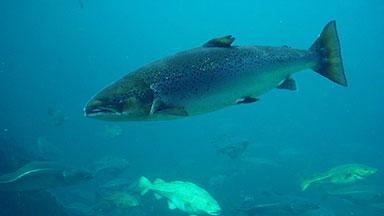Scottish consortiums take giant leap forward for salmon gill health
The two consortiums will help to understand and prevent diseases affecting farmed salmon.

Two research consortiums, co-funded by the Scottish Aquaculture Innovation Centre, will explore diseases affecting farmed salmon and how to prevent them.
One of the consortiums is led by Professor Ross Houston at The Roslin Institute together with Dr Alastair Hamilton of Landcatch Natural Selection and will analyse the genetic characteristics that cause some salmon to be more vulnerable to sea lice and amoebic gill disease. The results will help the aquaculture industry to breed fish with enhanced resilience to parasitic diseases in a more accurate and affordable way by improving a technique known as genomic selection.
The other consortium will explore the factors that can cause gill damage or disease to occur – such as the local environment, water quality and temperatures, as well as nutrition, farming practices, and equipment – while also examining how better to prevent and control the condition.
The challenge of gill health
Scotland is the third largest producer of salmon in the world, according to recent figures from the Scottish Government. In 2017 the industry produced 189,707 tonnes and supported around 8,000 jobs across the country, with an overall value of more than £1 billion to the economy.
However, in the last few years, impaired gill health has become a major challenge in an ever-changing natural environment, accounting for substantial losses of fish.
Gill health is up there with sea lice as one of the biggest challenges facing salmon farming, not only in Scotland, but across all salmon-producing countries. This is an internationally significant issue, which we’re aiming to address through this focussed effort from some of the top minds in the field. “The health of a fish’s gills is absolutely critical to its overall wellbeing. The outcomes we are looking for from these projects are to help provide the industry with the knowledge and tools it needs to manage and control outbreaks, and – further down the line – to prevent disease as far as we can by breeding fish with greater natural resistance.
Research and Industry
The projects will bring together the expertise of a range of world-renowned businesses and academic institutions, led by Scotland’s Rural College, The Roslin Institute , Loch Duart - an independent salmon farming company, and Landcatch Natural Selection - a leading salmon breeding business and part of Hendrix Genetics. Another ten organisations will also contribute to the two consortiums.
Related links
Collaboration to support fish breeding in Brazil


